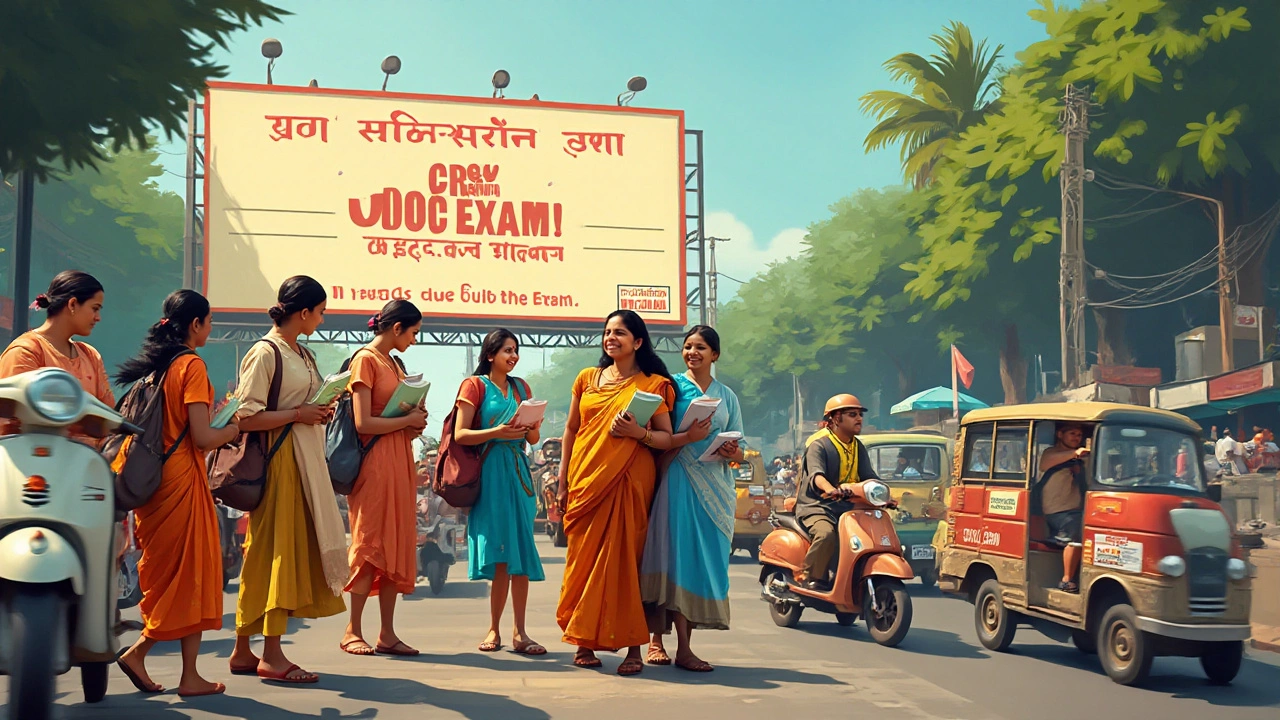In the vast landscape of competitive exams, certain tests stand tall, renowned for their immense difficulty and the dedication they demand from aspiring candidates. Such exams are not just a test of one's academic prowess but a true measure of determination and strategic thinking.
These formidable assessments have been shaped by intense competition and the high stakes that come along with them, often being the gateway to prestigious careers or educational opportunities. So, what exactly sets these exams apart, and why do students across the globe spend countless hours preparing for them?
By exploring some of the most challenging exams worldwide, we can gain a deeper understanding of what makes them so intimidating and learn valuable insights from those who've successfully navigated these academic trials.
- Introduction to Challenging Exams
- Understanding the Criteria for Toughness
- A Closer Look at Globally Renowned Exams
- Insights from Successful Candidates
- Tips for Preparing for Tough Exams
Introduction to Challenging Exams
The world of academic assessments is vast, with students facing a myriad of challenges on their journey to success. Among these, some competitive exams are crafted to test the boundaries of human endurance and intellectual capability. They're not just about what you know but how you think, adapt, and overcome under pressure. These exams hold an aura of mystery and fear, and they’re much more than just a pen-and-paper test. They represent a rite of passage for countless individuals dreaming of securing a coveted spot in elite institutions or top-tier career paths.
These exams serve as the ultimate benchmark for academic excellence and readiness. For instance, India's UPSC is considered one of the toughest civil services exams in the world, requiring candidates to master an extensive range of topics from ancient history to contemporary affairs. In China, the GAOKAO is a significant life event, impacting students' futures and often dictating their professional paths. The rigor of these exams is such that the preparation phase becomes a central aspect of candidates' lives, often spanning years of dedicated study, with success rates frequently being dauntingly low yet inspiringly aspirational.
Global Perspectives on Examination Toughness
Challenging exams exist in a variety of formats, reflecting different cultural and systemic approaches to measuring knowledge and aptitude. In France, the Baccalauréat requires mastery in multiple disciplines before attending university. Meanwhile, Japan's National Center Test pushes prospective university students to demonstrate their prowess across subjects rigorously. Each of these exams serves as a universal measure, reflecting the profound emphasis societies place on scholastic achievement. Indeed, Thomas Jefferson once remarked, "I am a great believer in luck, and I find the harder I work, the more I have of it." This sentiment rings especially true in the context of these demanding examinations.Facing such formidable challenges, students develop not only in academic capability but also in resilience and strategic thinking. They become adept at time management, stress endurance, and critical analysis. These exams are thus crucibles of formation, forging the leaders and innovators of tomorrow. As the world becomes more interconnected, understanding the landscape of these global exams provides insight into the diverse educational terrains that cultivate tomorrow’s trailblazers.
Understanding the Criteria for Toughness
When we label an exam as one of the toughest in the world, it is not just about the content it covers. Numerous factors contribute to its perceived difficulty, stemming from the nature of the exam itself to external societal pressures. One primary aspect is the breadth and depth of the syllabus. Exams like the Chinese GAOKAO challenge students with a wide range of subjects that demand both keen understanding and quick recall. Mastery across this range tests the resilience and versatility of the examinee.
Equally important is the sheer number of candidates who appear for these tests, often in the millions. The intense competition creates a landscape where the margin for error is remarkably slim. Successful candidates frequently need scores that are almost flawless to stand out in the competitive exams. This pressure is highlighted in the UPSC exams in India, which see a success rate of less than 1%, a statistic that underlines the challenge not just in preparation, but in execution. Such low pass rates amplify the stakes, as many lives and careers hinge on succeeding in these exams.
Another factor is the psychological and emotional stress associated with the anticipation and long preparation periods. The societal expectations and familial aspirations surrounding these exams can be overwhelming. Aspiring students often dedicate years, abandoning other pursuits to focus solely on achieving exemplary results. This level of dedication, akin to training for a marathon, is essential in both mental and physical endurance. As the education psychologist Dr. Lin Mei said,
"It's not only a test of intelligence, but a test of character and resilience. The toughest exams often become a rite of passage, endlessly shaping the path of every hopeful candidate."
Exam formats also play a role in determining an exam's toughness. The inclusion of negative marking, the types of questions that encourage higher-order thinking, or the length of the exam itself—all contribute to the difficulty of the challenge. In Japan, students attempting the National Center Test or the University Entrance Exams must tackle both multiple-choice and essay formats, demanding proficiency not just in knowledge recall, but in communication and problem-solving skills. Additionally, these exams often undergo constant revisions to attract the best and the brightest, ensuring that they remain a relevant measure of modern capabilities.
Perhaps one of the most telling criteria is the global reach and recognition of certain exams. For example, the International Baccalaureate (IB) Diploma Programme examinations are regarded as tremendously challenging, not just due to their rigorous content, but because they are recognized by leading universities worldwide. This broad acceptance makes successful completion of these exams a significant milestone in a student's academic journey, exemplifying the prestigious stature they hold and the hurdles students must overcome to achieve success. Thus, the criteria of toughness extend beyond a mere assessment of intellect, intertwining cultural, psychological, and strategic elements that together shape the most formidable exams in the world.

A Closer Look at Globally Renowned Exams
When it comes to the toughest exams on the planet, certain assessments consistently make the list, each bringing its own set of challenges and expectations. These exams are often benchmarks that push the boundaries of exam preparation in ways few others do. For instance, the Indian Administrative Service (IAS) exam, part of the larger Union Public Service Commission exams (UPSC), is notorious for its vast syllabus and low success rate. Held annually in India, it attracts hundreds of thousands of aspirants for just a few coveted positions. The multidimensional nature of this exam, which includes a preliminary screening of objective-type questions, a comprehensive mains exam, and a personality test interview, ensures only the most resilient candidates succeed.
Likewise, the GAOKAO, China's National College Entrance Examination, is a significant milestone for students aiming for higher education within the country. The concentrated pressure exerted by the toughest exams during this period in a student's life cannot be overstated. Held once a year, the GAOKAO is more than just an assessment of academic skills; it serves as a definitive factor that can dictate the course of a student's future education and career path. Each year, millions prepare for this exam with intensity, knowing it can be the gateway to prestigious universities. In Japan, similar stress surrounds the University Entrance Center Test, where students endure extreme competition for places in the top universities. Known for its meticulous structure, the scores determine eligibility for the university-level entrance examinations.
These exams underscore the significant role educational culture plays in shaping the academic environment. An examination like South Korea’s College Scholastic Ability Test (CSAT) is taken so seriously that the entire nation demonstrates focused support. Businesses delay office hours, and flights are grounded to minimize disruptions during this pivotal exam day. It's indeed a societal event that changes normal routines, highlighting its stature as a rigorous and high-pressure examination.
As Haruki Murakami once aptly put it, "If you remember me, then I don't care if everyone else forgets." The sentiment can be likened to the dedication students show when they take on these grueling exams.
Turning our eyes westward, the United States' Medical College Admission Test (MCAT) is another exam noted for its demanding nature. Each year, tens of thousands sit for this exam, aspiring to enter medical schools across the country. The MCAT's value-based testing evaluates knowledge in scientific concepts, critical problem-solving, and reasoning skills which not only challenges one's intellect but also gauges emotional readiness for the demanding field of medicine. It is a comprehensive indicator of an individual’s capability to handle the rigorous training ahead.
Interestingly, no matter where these exams are held globally, the underlying attribute they share is their demand for intense dedication. The preparation for these exams becomes a way of life, incorporating long hours of study, unwavering motivation, and a strategic approach. By understanding and dissecting what makes these global exams distinctively challenging, aspirants can better assess their readiness and devise effective preparation strategies. As these exams test beyond intelligence and academic knowledge, one's resilience and adaptability often tip the scales towards success.
| Exam | Location | Highlights |
|---|---|---|
| UPSC | India | Comprehensive, low-pass rate |
| GAOKAO | China | Gateway to top universities |
| CSAT | South Korea | Nationwide event |
| MCAT | USA | Critical thinking and problem-solving |
Insights from Successful Candidates
When it comes to cracking the toughest exams in the world, the wisdom of those who've already succeeded is invaluable. Many successful candidates attribute their achievement not just to relentless study sessions but a combination of strategic approaches, resilience, and mental fortitude. For instance, the daunting Indian UPSC Civil Services exam demands not only a strong grasp of academic concepts but also a deep understanding of current affairs and analytical acumen. Candidates often emphasize the importance of a well-rounded preparation strategy that balances knowledge acquisition with critical thinking skills.
One key insight from past achievers is the necessity of structured planning. Crafting a detailed study schedule that allocates specific time slots for each subject or section can significantly enhance focus and productivity. This rigorous planning is often complemented by regular self-assessment through mock tests and previous years' papers, which help in identifying weaknesses and areas for improvement. Moreover, motivation and consistency emerge as crucial elements, with successful candidates integrating regular breaks and leisure activities to avoid burnout. As one topper shared, "Consistency and perseverance are more important than just last-minute cramming."
Additionally, forming study groups or joining coaching centers can serve as a catalyst for sharing knowledge and different perspectives, which might not be possible through solo study efforts. Engaging in discussions enables candidates to delve deeper into complex topics and gain insights that solitary studying might not offer. Another critical aspect many successful candidates highlight is the importance of staying updated with recent developments, especially for exams where current events play a significant role. This requires integrating reading newspapers, watching educational news channels, or following reputable online platforms into daily routines.
"The ability to adapt and improvise is crucial. The exam pattern evolves; therefore, one's strategy must also evolve," states a former top scorer of the GAOKAO, China's formidable national college entrance exam.
One interesting perspective comes from the reliance on digital resources and online platforms, providing flexibility and accessibility to vast materials and expert lectures. Many candidates underline the role of technology as a tool for optimization in their preparation journey. Mobile apps that offer quizzes and flashcards or websites hosting free lectures have democratized access to quality education materials, enabling students to tailor their prep with more precision than ever before. Coupled with this, maintaining a balanced diet and regular exercise regimen enhances cognitive function and keeps stress in check, which is often highlighted as equally vital as studying hard.
The journey to overcoming these competitive exams is challenging, yet the stories from successful candidates illuminate the path. They teach us that while multiple diagrams and facts are essential, it is equally crucial to remain adaptable, maintain one's well-being, and cultivate an unshakeable resolve to excel despite obstacles.

Tips for Preparing for Tough Exams
Facing the world's toughest exams requires more than just a decent grasp of the syllabus. It's a journey that demands strategic planning, mental fortitude, and the ability to adapt under pressure. Preparing for such exams is akin to preparing for a marathon; it requires stamina, perseverance, and meticulous attention to detail. A key aspect is understanding the structure and requirements of each specific test. Diving into past papers, reviewing the types of questions commonly asked, and identifying areas of frequent focus can provide valuable insights that guide your study sessions in the right direction.
Creating a structured study schedule is another essential factor. It helps break down the vast amount of material into manageable chunks, allowing for focused revisions without feeling overwhelmed. Allocating time for regular breaks is crucial, too; your mind needs time to rest and absorb information effectively. A well-planned timetable that includes periodic assessments of your progress can significantly enhance your preparation efforts. More than just rote learning, focus on building a deep understanding of the subject matter. Engage with multiple resources, attend workshops if they are available, and participate in study groups where discussing ideas often leads to improved comprehension.
Adopting an adaptive learning approach with the help of modern educational tools can also prove beneficial. Online platforms and apps offer personalized learning paths that cater to individual strengths and weaknesses. Additionally, various platforms offer practice tests that mimic the format of real exams. These practice runs are invaluable as they not only familiarize you with the exam style but also help in managing time effectively. Knowing which sections require more time and which ones are your strong points is essential strategy work.
Equally significant is the mental preparation for what seems like an insurmountable challenge. Maintaining a positive mindset and resilience can make a stark difference. Engage in activities that reduce stress such as meditation, exercise, and hobbies that keep your mind refreshed and focused. Surround yourself with a supportive network—whether it's family, friends, or mentors—who can provide you with the encouragement and motivation when things seem daunting. The words of Henry Ford resonate aptly, "Whether you think you can or you think you can’t, you’re right." Confidence plays a pivotal role in tackling any tough exam.
Data from various studies supports that students who follow a balanced approach to revision tend to perform better. For instance, statistics from a recent survey revealed that students who incorporated at least 30 minutes of physical activity daily saw a marked improvement in focus and retention rates. Hence, it's beneficial to strike a balance between rigorous study sessions and effective leisure activities.
Finally, approaching the exam day with clarity and confidence is crucial. Make sure to prioritize your health; adequate sleep and nutrition can significantly impact performance. On the day of the exam, ensure you have all the necessary materials, arrive early, and maintain a calm composure. Remember, the preparation is done, and all that's left is to execute with calm determination. Embrace the challenge with a positive mindset and believe in your preparation and capabilities. The journey might be arduous, but the rewards are often worth the effort.
